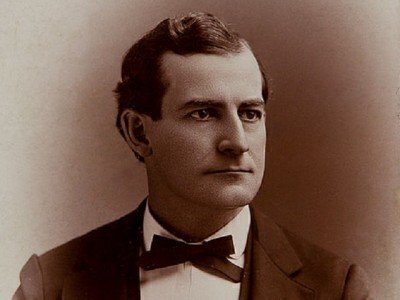On July 26, 1925, about five days after the famous Scopes Monkey trial, the famed orator and politician William Jennings Bryan died after a lunchtime meal. Bryan had technically won the trial that defined the end of his public career, which had started 35 years earlier.
 Days earlier in the small town of Dayton, Tennessee, a jury found high school teacher John Scopes guilty of teaching evolution in violation of the Butler Act and fined him $100 dollars for his actions. The prosecution in the Scopes case was led by none other than Bryan, three-time presidential candidate, Secretary of State, congressman, and fixture of the Democratic Party.
Days earlier in the small town of Dayton, Tennessee, a jury found high school teacher John Scopes guilty of teaching evolution in violation of the Butler Act and fined him $100 dollars for his actions. The prosecution in the Scopes case was led by none other than Bryan, three-time presidential candidate, Secretary of State, congressman, and fixture of the Democratic Party.
In what otherwise might appear a relatively ordinary trial, the country framed it as a larger fight between Fundamentalism and Modernism, and the media spread coverage of historic proportions. The case brought to Dayton 200 newspaper reporters, 22 telegraphers transmitting over 165,000 words a day, and even the construction of a special airstrip so that cameramen could send out their work each day. For just over a week, the world descended on this obscure American town to watch the so-called “Monkey Trial,” with heavyweights representing both sides.
A young lawyer out of Illinois, Bryan moved to Lincoln, Nebraska with dreams of a political career. He won a congressional seat in 1890 and held it for two terms, vaulting his populist policies and oratory skills to national attention. Despite losing the 1894 election, he was able to gain prominence by appealing to the Midwestern, populist roots of his party, in the long run pushing the Democrats away from a platform of laissez-faire economics.
Bucking the moneyed class in the party, Bryan spoke out against the gold standard, instead advocating a “bimetallic” currency that included silver. He delivered a widely hailed speech entitled “Cross of Gold” at the 1896 Democratic Convention, in which he advocated the Free Silver movement in order to empower America’s working class.
The Convention chose him over sitting President Grover Cleveland, but he was resoundingly defeated by Republican nominee William McKinley. Once again earning the nomination in 1900, he again lost to incumbent McKinley. His platform of anti-imperialism, specifically manifested in the issue of the Philippines, did not stand out from the establishment Republican view, so voters ultimately chose McKinley on his economic credentials.
His last try at the presidency came in 1908 when he once again took the Democratic nomination, but his attempt to undermine Theodore Roosevelt’s presidency and his hand-picked successor William Howard Taft failed, due to the economic success of the country at the time.
Throughout this time, he undertook paid speaking tours throughout the country, and in his role as a candidate, was one of the first candidates to openly canvas votes through campaign trips. His stump speeches included lectures about Christianity, anti-imperialism, women’s suffrage, prohibition, and progressive economic values; his public persona ensured that, despite his political losses, he stayed relevant within the party. By helping to secure the election of Woodrow Wilson in 1912, he earned an appointment to the Secretary of State position, where he was overshadowed by the prolific president. Perhaps his biggest concrete policy accomplishment was negotiating conflict mediation treaties with over 28 countries prior to World War I. As the Great War broke out, he urged Wilson to avoid entanglement and to help resolve the issue, and opposed the president’s newly aggressive stance in response to the sinking of the Lusitania. He resigned in 1915, unable to support the impending war efforts.
Over the next decade, Bryan involved himself in a wide range of activist causes, including prohibition and women’s suffrage, and finally fighting the evolution movement. He saw the scientific explanation of the origin of humans as reprehensible since it demonstrated that humanity had a self-centered, materialistic viewpoint. In his view, the theory of Darwinism endorsed social injustice and evil, conflicting with the morality of Christianity. In contrast to modern fundamentalists, Bryan did not completely reject the validity of the natural selection theory but thought it should fit in with a religious framework.
Having spent years laboring to pass anti-evolution laws in the states, Bryan quickly took to defending the Butler Act in Tennessee in the Scopes trial. The case was actually designed by the ACLU as a test for the law, and the civil rights organization settled on the high school teacher as a perfect candidate to challenge the law. Since the court refused to consider evidence on whether the law itself was constitutional, despite eloquent arguments about the place of science and religion from famed defense attorneys Clarence Darrow and Dudley Malone, the outcome of the case was not as significant as the arguments and its players.
Bryan’s confrontation with Darrow and Malone on the witness stand was legendary. Since the defendant requested a guilty conviction, there was no need for closing arguments, and the judge quickly imposed the $100 fine after the jury decision.
The case went on to the Tennessee Supreme Court, where Chief Justice Grafton Green rejected all four claims brought by Scopes and his legal team. The penalty for Scopes was thrown out on a technicality; under Tennessee law, since only juries could declare fines over $50. Yet the moral victory seemed to be with the fundamentalists. Although Bryan won his final case legally, his real effect was to bring more attention to an issue that is still present to this day.







